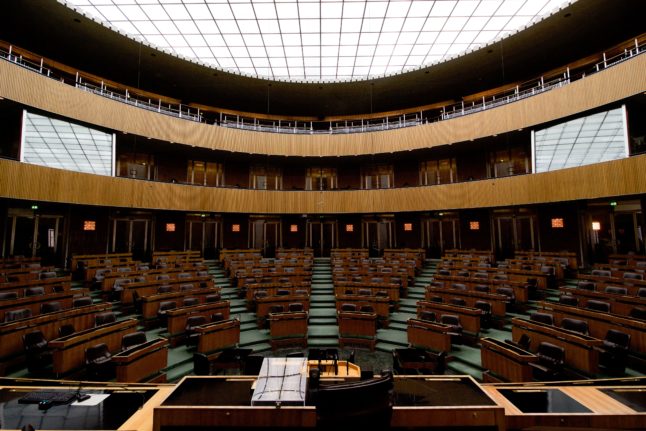Collective agreement negotiations for Austrian Airlines onboard staff fail
The collective agreement negotiations for Austrian Airlines’ on-board staff have hit a roadblock, with talks being abruptly halted by the works council on Thursday, broadcaster ORF has reported. The looming threat of works meetings and strikes during the crucial Easter travel period adds pressure to the situation.
An AUA spokeswoman expressed hope for a swift return to the negotiating table by the works council, as negotiations were scheduled to continue on Friday. Despite the setback, the company remains open to discussions, she said.
Daniel Liebhart, Chairman of the vida aviation section, criticised AUA’s bargaining stance, demanding a transparent and fair offer. Liebhart accused the company of manipulating figures and attempting to push the workforce into a strike scenario during the Easter travel rush.
According to Liebhart, if AUA fails to make a substantial offer, works meetings, warning strikes, and full-scale strikes could loom. The works council will discuss the next course of action on Friday.
Holy Week is a crucial time for travel, and recent flight cancellations due to work meetings have disrupted travel plans. The AUA spokeswoman hoped for a resolution to avoid further disruptions during the Easter holidays.
Regarding salary increases, AUA’s proposed figures, ranging up to 18 percent on average for cockpit and cabin staff and up to 28 percent for co-pilots, were met with scepticism by vida and the works council. However, the employee representatives have not publicly articulated their specific demands.
AUA advocates for a longer contract term until the end of 2025, while the union prefers negotiations until the end of 2024. The company’s package includes significant salary hikes, profit-sharing increments, and a lengthened agreement term, aiming to address employee concerns and ensure stability in the long term.
READ ALSO: What’s open and what’s closed in Austria over Easter weekend?
How widespread is racism in Austria?
The number of racist incidents in Austria decreased last year compared to the previous year, a new study has found. But experts say many cases go unreported.
ÖBB boosts rail service with new fleet of rail jets
ÖBB (Austrian Federal Railways) has taken steps to enhance its rail service by ordering 19 additional Railjets following issues encountered last winter. The new trains, supplied by Siemens, are part of a larger order totalling 27 sets. They will gradually be integrated into service, including routes along the Brenner and Southern lines, by 2028. The recent order represents an investment of approximately 405 million euros by ÖBB.
The decision to expand the Railjet fleet comes after ÖBB faced technical challenges with the existing trains during the previous winter, particularly around Christmas 2023. The railway company is introducing modernised Railjets with enhanced features and comfort to address these issues and improve service quality.
Starting April 8, 2024, the first of these new trains will operate on routes such as Munich-Innsbruck-Bolzano, Verona-Bologna, and Munich-Innsbruck. ÖBB promises passengers a superior travel experience with upgraded amenities, including multi-adjustable seats with increased privacy, additional storage options, integrated charging stations, and improved signage for easier navigation.
The revamped Railjets also cater to diverse passenger needs, with provisions for cyclists, wheelchair users, and those seeking barrier-free travel. First Class and Business Class cabins offer premium furnishings with leather and real wood accents, while the train restaurant provides a comfortable space for dining and relaxation.
Tanja Kienegger, CEO of Siemens Mobility Austria, underscored the local economic benefits of the project, highlighting the high value generated in Austria through innovation and manufacturing processes.
With speeds of up to 230 km/h, the new Railjet fleet ensures efficient and comfortable travel. It boasts a total capacity of 532 seats across various classes. Passengers can enjoy improved connectivity with mobile phone-permeable window panes and complimentary onboard Wi-Fi, further enhancing the overall travel experience offered by ÖBB.
READ ALSO: Every 18-year-old in Austria to get free KlimaTicket
Record number of deportations in Austria in 2023
In a press conference held jointly with the Federal Office for Immigration and Asylum, Interior Minister Gerhard Karner (ÖVP) declared 2023 as “the year of deportations,” revealing a record figure of 12,900 individuals leaving the country. Of these, 54 percent departed voluntarily, while the rest were forcibly deported, the daily Der Standard reported.
Most deportees hailed from various European countries, with significant numbers from Slovakia, Hungary, and Romania. Notably, Slovakian nationals constituted 1,380 of the 5,990 individuals subjected to forced removal. Under EU law, EU citizens can only be deported if a court deems them a public order or security threat.
Karner underscored that 45 percent of all deportees had prior criminal convictions, emphasising the government’s commitment to removing individuals who pose a risk to public safety. Efforts have mainly targeted those involved in organised crime, including drug-related offences and illegal employment.
According to Karner, Austria’s increased focus on deportation has made the country less attractive for human smugglers, aided by strengthened border controls and 30 repatriation agreements with other nations, including recent accords with Bulgaria and Romania.
Karner also expressed intentions to expand deportation efforts for individuals from Syria and Afghanistan, aiming to return them to safe regions such as around Damascus or away from Taliban-controlled areas.
Austria received approximately 60,000 asylum applications in 2023, with 14,748 individuals granted asylum and around 24,000 applications rejected. Additionally, over 30,000 cases were withdrawn, primarily involving transit migrants apprehended by police and subsequently applying for asylum to avoid immediate repatriation before moving on.
READ ALSO: Austrian extremist met with German far-right party to discuss ‘mass deportation of immigrants’
National Council rejects proposal to lower age of criminal responsibility
A motion to lower the age of criminal responsibility to twelve years old was defeated in the National Council session that concluded on Thursday evening. The proposal, put forward by the Freedom Party, failed to garner enough support, with no other party backing the initiative, Die Presse reported.
The voting process, conducted by roll call as requested by the Freedom Party, revealed that only 20 out of 30 FPÖ MPs participated. This led to speculation that the party’s parliamentary group leader, Herbert Kickl, lacked full support from within the party.
In a subsequent debate, the FPÖ attempted to push forward a non-binding resolution with similar content but found itself isolated again. Only eight FP MPs voted in favour of the resolution.
The FPÖ justified its proposal by citing the gravity of crimes such as robbery, murder, and rape, stressing the need for society to respond appropriately. Justice spokesperson Harald Stefan emphasised the importance of addressing such crimes without looking the other way. Secretary General Michael Schnedlitz attributed these acts to young people, whom he claimed had entered the country during the refugee wave in 2015, stating, “Anyone old enough to commit murder and rape is old enough to be held accountable.”
While the ÖVP had previously considered lowering the age of criminal responsibility, Justice spokesperson Michaela Steinacker criticised the FPÖ’s proposal as simplistic and one-sided. Steinacker highlighted the importance of consulting experts and considering accompanying measures if such a change were to be made.
If you have any questions about life in Austria, ideas for articles or news tips for The Local, please get in touch with us at [email protected] or leave a comment below.



 Please whitelist us to continue reading.
Please whitelist us to continue reading.
Member comments